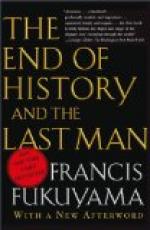|
This section contains 6,653 words (approx. 23 pages at 300 words per page) |

|
SOURCE: “Professor Hegel Goes to Washington,” in New York Review of Books, March 26, 1992, pp. 7-8, 10-3.
In the following review of The End of History and the Last Man, Ryan provides an overview of Fukuyama's historical and intellectual perspective and the book's appeal to conservative critics. Ryan objects to Fukuyama's historical determinism and assumptions about the nature of and inevitability of liberal democracy.
Francis Fukuyama's discovery of the end of history first came to the public's attention in the summer of 1989. The essay he wrote for The National Interest on “The End of History?” made the headlines in Time, Newsweek, and elsewhere; it was for a short time a truly global sensation. The news that history had ended aroused much disbelief. Even those who were glad that Fukuyama had declared that democracy was in no further danger from its rivals were not persuaded that this was because history...
|
This section contains 6,653 words (approx. 23 pages at 300 words per page) |

|


